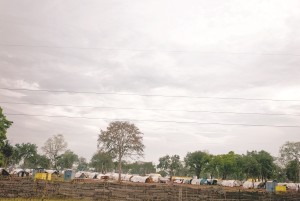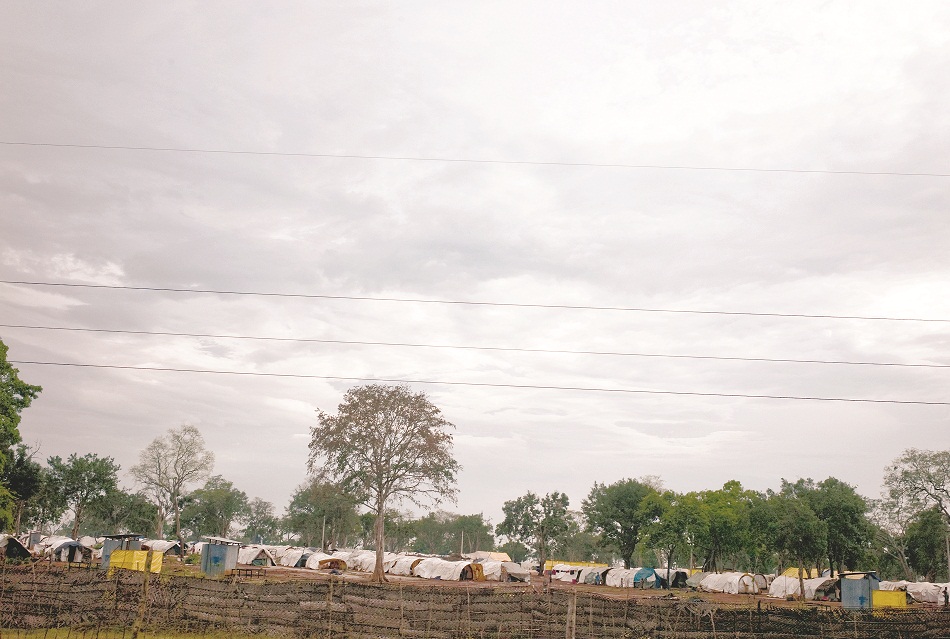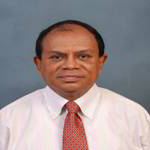Laksiri Fernando
Anyone of course has a right to advocate ‘abolishing the 13th Amendment’ or anything else for that matter. Sri Lanka should be a free country for peaceful political expression. But what is worrying is the almost ‘fanatical’ advocacy of the ‘abolition of devolution’with the 13th Amendment by the Defence Secretary, Gotabhaya Rajapaksa. What is apparent is his ‘anti-Tamil’ crusade.
 |
Devolution and the 13th Amendment are the ‘trophies’ that the government has been showing the international community and the UN as indications of Sri Lanka’s commitment to resolve the ethnic question in the country. Backtracking on them would undoubtedly spell disaster for the country in the international sphere.
Could there be a connection between his present anti-Tamil crusade and his ‘war crusade’during the last stages of the war? This is not mere speculation, but something important to investigate and/or research in terms of accountability, rule of law, good governance and democracy.
Implications
When one Googles Gotabhaya Rajapaksa what comes prominent, of course after his handsome images, are what he told the BBC recently about ‘North is not just for Tamils’ and the ‘TNA should be accountable for LTTE atrocities’ etc. and etc. This is irrespective of him being a public servant. The latter pronouncement was uttered just after the government released Kumaran Pathmanathan (KP), who in fact has an Interpol arrest warrant and well known for at least arm procurements for terror activities of the LTTE against the state and the people. If Gotabhaya Rajapaksa is a good defence professional, he should keep quiet on political matters focusing on his defence matters. Citizens have every right to protest against this blatant deviation.
When he says that the North is not just for Tamils, there is an element of truth in it. There are Muslims and also Sinhalese. But this should not preclude Tamil speaking people claiming the North as their ‘historical habitation’ or even‘homeland.’ Moreover, the question is the way he says it and the context. He is undoubtedly emotional and frenzied and that is an indication of prejudice and perhaps something worse than that. ‘Google’ also says that he was the key person who didn’t want the national anthem to be sung in Tamil by the school children in the North!
The implication of the abolition of the 13th Amendment would be not only on devolution but also on the Tamil as an official language. Without the 13thAmendment, the Tamil will be relegated into a mere ‘national language’ or‘language of administrative use’ in some provinces. Even this might be doubtful the way things are moving in this ‘miracle of Asia’ these days. This is exceedingly a controversial matter with far reaching implications on the rights of the minorities both Tamils and Muslims. With the abolition of the 13thAmendment, all what Vasudeva Nanayakkara has been doing or ‘pretend to be doing,’ as the Minister of National Languages and Social Integration, will go for mere sixes.
No one would doubt that the 13th Amendment is beset with some legal and practical infirmities. That is one reason why the Provincial Councils cannot properly utilise its great potential to develop the regions outside the Western province. This is common to many legal enactments including the Constitution itself, and particularly its various amendments. The 17th Amendment was another example. Although there is a government in place with more than a two third majority, of course with untenable alliances, there is no broader vision or democratic commitment, with people’s interests and future at heart. Or otherwise many of these defects could be or could have been rectified in the right direction.
What is happening instead is completely the opposite. The 18th Amendment is the best example. On the pretext of rectifying the weaknesses, the spirit of the 17th Amendment was completely annihilated by restricting the independence of the independent commissions and also taking the opportunity to do away with the limited terms for the Presidency. Now the independence is a question of asserting that right, like what the judiciary demonstrated in recent times. Without asserting independence, no commission or institution would be true to its purpose.
Indigenous Roots
There are arguments against the 13th Amendment that it was an Indian imposition. Yes, devolution would not have come to Sri Lanka in practical manner if not for the Indian insistence through the Indo-Lanka Agreement. It is quite natural for a neighbouring country to flex its muscle, if the country concerned treats sections of its population badly who are kinsfolks of its or sections of its population. This is however no excuse for any country to support terrorism or separatism of another country.
There are however indigenous roots to the concept of devolution in Sri Lanka. Even in ancient times, the polity was a devolved structure in a ‘Mandala’ fashion (Manda=centre; la=provinces). We know about what were known as Ruhunu, Maya and Pihiti.
The founder of the Sri Lanka Freedom Party, SWRD Bandaranaike, proposed even federalism in 1927. The Kandyan Association asked for the same before the Donoughmore Commission in 1928. Again in 1937, there was a Sessional Paper, after a careful study, proposing devolution, the province as the unit of devolution. Both the Bandaranaike-Chelvanayakam Pact (1957) and the Senanayake-Chelvanayakam Pact (1965) envisaged devolution through regional (provincial) councils or district councils.
Therefore, when the provincial council system was introduced in 1987, it was in line with what had been discussed and agreed upon at different times in the country for a long period. A recent study by the Finance Commission states the following.
“Provincial Councils are a functional reality. People have become accustomed to the system. From an economic and developmental planning point of view, the Province might make more sense than the District. The District and the Division could be the implementation units of a provincial plan. The Province is a common unit in fast developing economies like China and Vietnam.”
The study also says, “There are more opportunities in having a realistic view of the system in order that the system is better utilized for (1) ethnic/social reconciliation, (2) economic and national development and (3) further strengthening the democratic structures in the country.”
The UPFA 2010 Manifesto, Mahinda Chinthana, also promised to continue with the Provincial Council system, if necessary with positive amendments, in the following words.
“After two decades, we now have experience regarding the Provincial Council system. Different opinions and views regarding the relevance or irrelevance and features of the system are discussed. There are those who are in favour of the system and those who are not. However, it is an intrinsic part of the constitution through the 13th amendment and is a functional system.”
It promised to improve on it but not to abolish it as some of the extremist parties of the UPFA, probably under the instigation of the Defence Secretary, now clamouring for. The Chinthana said,“I am in favour of an open discussion on the amendment to the Provincial Council system. This discourse will be the basis for the discussion that I intend to initiate with all political parties and organizations.”
Ambiguities
There is no question that the President’s policy on the matter has always been wishy-washy which is very clear from the last two sentences quoted above. Otherwise, by 2010 the government had the APRC Recommendations and two reports from the Experts Panel, for the government to take a clear decision and amend the provisions if necessary. There was no need to open again the ‘Pandora’s Box’in the form of another Parliamentary Select Committee. Even without revising the system, the present devolution could have been implemented through compromises and mutual understanding.
The most unsatisfactory in the system is the meagre funds allocated for its functions. It is only in the range of 10 per cent of the total budget, which should at least be raised to 30 per cent in the immediate future. In fast developing countries like, India, China or Vietnam, the provincial budgets amount to much larger proportions.
The most important step after the defeat of the LTTE in 2009 would have been to hold the elections to the Northern Provincial Council. If that was done, even a Council favourable to the government could have been the result, if that is the criteria to judge whether there is a threat of separatism or not. This was basically prevented because of the Defence Secretary’s intransigence, military thinking and lack of even political common sense. He seems to be more influential than the President himself or the major party in the UPFA, the SLFP, on the subject of devolution and how to resolve or not to resolve the ethnic issue in the country.
It is also on record that the President talked about ‘13 Plus’ and even in January this year, when the External Affairs Minister of India, SM Krishna came to Colombo, it was reiterated. More importantly, there was a joint statement by India and Sri Lanka in May 2011 and the relevant section of the statement said,“A devolution package, building upon the 13th Amendment (13A), would contribute towards creating the necessary conditions for such reconciliation.”
It is true that the LLRC Report does not make a clear recommendation on the issue of the 13th Amendment. For example, both groups of people who are for and against the 13th Amendment quote different sections from the report for their convenience. But when taken all these sections together, it is clear that the LLRC wanted to deepen devolution further and in that sense and in that sense alone that they suggest “devising an appropriate system of devolution that addresses the needs of the people.” But the abolition of the 13thAmendment is completely against the recommendations and spirit of the LLRC Report. If you ask the Commissioners, they would say so.
Devolution and the 13th Amendment are the ‘trophies’ that the government has been showing the international community and the UN as indications of Sri Lanka’s commitment to resolve the ethnic question in the country. Backtracking on them would undoubtedly spell disaster for the country in the international sphere. The full implementation of the 13th Amendment was there in the periodic report to the UNHRC. Facing the second review just started in Geneva on 22 October, and India being a key country in that process, the Defence Secretary’s arrogant utterances would fix Sri Lanka again into a tight corner.
Conclusion
Sri Lanka’s predicament on the 13th Amendment is a difficult one. If there can be an objective and a dispassionate analysis on the matter that would call for at least some revisions or redesigning of the devolution scheme, yet based on the provinces. There can be pluses, there can be minuses. It is not a question of plus or minus. But given the way that the Rajapaksa regime is presently managing politics, it is extremely dangerous to allow any change to the present devolution under the 13th Amendment. What they would do is what they did to the 17th Amendment. It is unfortunate, but it is the reality.
On the one hand, the regime is intoxicated with power and extreme power to be more precise. On the other hand, it is extremely paranoid about separatism, genuinely or not, even after decisively defeating the LTTE. These are two lethal combinations. This does not mean that there are no risks of resurgence of separatism in the country. Those risks have to be confronted as they come or otherwise Sri Lanka could move again along a perpetual vicious cycle of‘suppression-resistance’ and ‘further suppression and further resistance’ that would repeat the past history itself.
The breaking of this vicious cycle might not be an easy task. But it is possible by moderating positions. It is obvious that efforts should be made not only from the Sinhala side, but from the Tamil side as well. On the issue of the 13thAmendment, however, there cannot be any ambiguity; it should not be allowed to be abrogated. That is the present bottom line.

